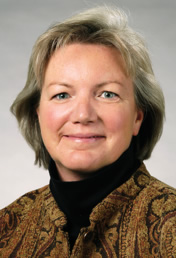 Jeanette Roberts, PhD, MPH, professor, pharmaceutical sciences division, and former dean of the School of Pharmacy, is among six health professionals selected for the Robert Wood Johnson Foundation (RWJF) Health Policy Fellows Program at the National Academy of Medicine.
Jeanette Roberts, PhD, MPH, professor, pharmaceutical sciences division, and former dean of the School of Pharmacy, is among six health professionals selected for the Robert Wood Johnson Foundation (RWJF) Health Policy Fellows Program at the National Academy of Medicine.
Beginning in September, the health professionals will spend a year in Washington, D.C., working on health-related legislative and regulatory issues with members of Congress and the executive branch. They will also engage in seminars and discussions on health policy and participate in leadership development programs.
The National Academy of Medicine (NAM), formerly the Institute of Medicine, and Robert Wood Johnson Foundation (RWJF) selected the 2015-2016 class through a national competition for highly accomplished health, behavioral, and social science professionals who have an interest in health policy. Their experiences in Washington will enrich their understanding of public policy formation and the ways federal and state government relate to the mission of their home institutions and local communities. The fellows program will commence with a three-month orientation, followed by a nine-month assignment in a congressional office or the executive branch, where they will be involved in health legislation and programs. After their Washington assignment, fellows will continue to receive support to sustain their development as health policy leaders.
“I am very excited about spending a year in Washington, D.C. as a Robert Wood Johnson Health Policy Fellow. Understanding and contributing to federal health policy development, implementation, and analysis is a major goal. Being immersed in Congress, where health sciences education, research, and practice intersect with policy and politics, will be a life-changing experience. When I return to UW-Madison in fall 2016, I will integrate this experience with my global public health background, which will be invaluable as I continue my work with the newly-formed UW-Madison Center for Interprofessional Practice and Education and continue as a faculty member at the School of Pharmacy,” said Roberts.
Roberts most recently served as dean of the School of Pharmacy for 11 years. Her research interest is medicinal/pharmaceutical chemistry, specifically the biological aspects of drug/isotope/toxin targeting using prodrugs; monoclonal antibodies and/or liposomes; thiols and selenols as chemoprotective and chemopreventive agents.
In addition to Roberts, the following individuals are part of the 2015-2016 class:
- David Keahey, PA-C, M.S.P.H., assistant professor, department of family and preventive medicine, University of Utah Physician Assistant Program, Salt Lake City
- Robert Mabry, M.D., director of trauma care delivery, U.S. Department of Defense Trauma Center of Excellence, Fort Sam Houston, Texas
- Dayna Matthew, J.D., professor of law, University of Colorado Law School, Boulder
- Thomas Mayes, M.D., M.B.A., professor and chairman, department of pediatrics, University of Texas Health Science Center, San Antonio
- Y. Claire Wang, M.D., Sc.D., associate professor, department of health policy and management, Columbia University Mailman School of Public Health, New York City
“With several critical areas of health policy remaining at the top of the federal agenda, this class of fellows brings great expertise and health care experience to the decision making process,” said Marie Michnich, director of the RWJF Health Policy Fellows Program at NAM. “It promises to be an exciting year ahead, one where the fellows will have ample opportunity to both contribute and learn.”
For more than 40 years the Robert Wood Johnson Foundation has worked to improve health and health care. The National Academies of Sciences, Engineering, and Medicine are private, nonprofit institutions that provide independent, objective analysis and advice to the nation to solve complex problems and inform public policy decisions related to science, technology, and medicine. The Academies operate under an 1863 congressional charter to the National Academy of Sciences, signed by President Lincoln.